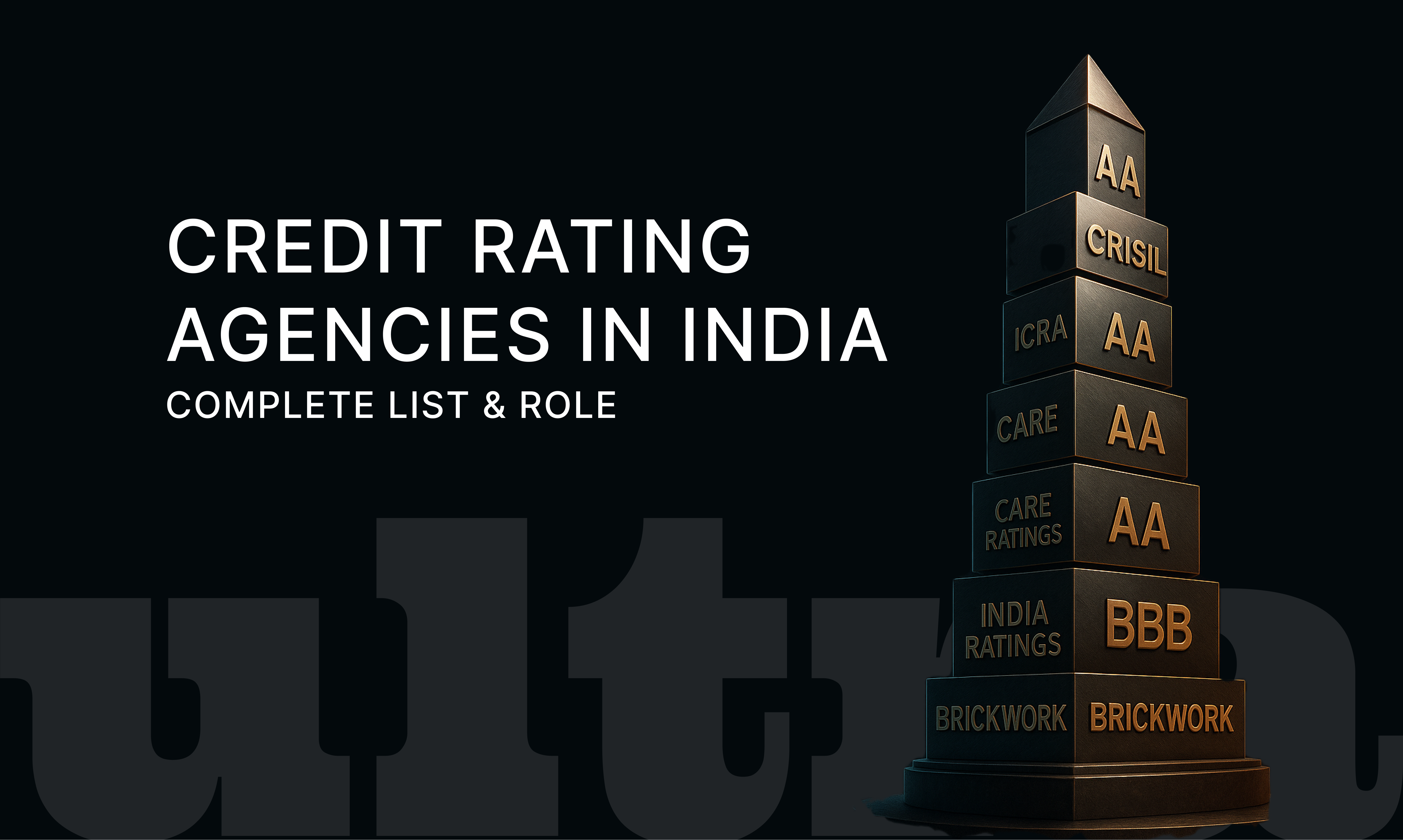What Are Credit Rating Agencies?
22 July 2025 · Sachin Gadekar
Which Are the Top Credit Rating Agencies in India?

Introduction
In India’s financial ecosystem, credit rating agencies play a crucial role in building trust and transparency between borrowers, lenders, and investors. From assessing the creditworthiness of companies and debt instruments to guiding investment decisions, these agencies help maintain a healthy flow of capital in the economy.
At Ultra, we help you understand how India’s top credit rating agencies operate, how many are approved by regulators, and how they impact your investment choices.
What Are Credit Rating Agencies?
Credit rating agencies (CRAs) are independent organisations that evaluate and assign ratings to companies, governments, or debt instruments such as bonds and debentures. These ratings indicate the ability of an entity to meet its financial obligations on time.
A higher credit rating reflects lower credit risk, while a lower rating signals higher risk. Investors, banks, and regulators rely on these ratings to make inf
Regulatory Approval: Who Governs Credit Rating Agencies in India?
In India, credit rating agencies are regulated by the Securities and Exchange Board of India (SEBI) under the SEBI (Credit Rating Agencies) Regulations, 1999. Additionally, the Reserve Bank of India (RBI) recognises certain agencies for banking-related purposes.
CRAs must adhere to strict guidelines to ensure independence, credibility, and accuracy in their ratings.
Top Credit Rating Agencies in India
Below is an overview of the top credit rating agencies in India approved by SEBI and recognised by RBI. Currently, India has six main SEBI-registered credit rating agencies:
1. CRISIL Limited
CRISIL is India’s first and largest credit rating agency, established in 1987. It is now a subsidiary of S&P Global and provides ratings, research, and risk solutions across industries and countries.
2. ICRA Limited
ICRA was established in 1991 and is an affiliate of Moody’s Investors Service. It offers credit ratings for corporates, banks, financial institutions, mutual funds, and structured finance.
3. CARE Ratings Limited
Established in 1993, CARE Ratings is one of India’s leading credit rating agencies known for its comprehensive ratings across various sectors.
4. India Ratings and Research Pvt. Ltd.
A wholly owned subsidiary of Fitch Ratings, India Ratings is renowned for its robust ratings framework and sector-specific research.
5. Brickwork Ratings India Pvt. Ltd.
Brickwork Ratings, founded in 2007, is accredited by SEBI and RBI. It focuses on MSMEs, banks, corporates, and municipal corporations.
6. Infomerics Valuation and Rating Pvt. Ltd.
Registered with SEBI and RBI, Infomerics Ratings is one of India’s growing credit rating agencies offering ratings for bonds, debentures, bank loans, and structured obligations.
Top Credit Rating Agencies in the World
Globally, the major credit rating agencies are:
Moody’s Investors Service
Standard & Poor’s (S&P)
Fitch Ratings
These three form the “Big Three” globally, with many countries, including India, having local players in addition.
How Do Credit Ratings Work?
Credit ratings are assigned based on a detailed analysis of an entity’s financial health, market position, debt repayment capacity, and external factors. Ratings range from ‘AAA’ (highest safety) to ‘D’ (default).
Companies use these ratings to issue bonds and raise funds at competitive interest rates. Investors use them to assess risk and returns.
Why Are Credit Rating Agencies Important?
Investor Confidence: Ratings help investors judge the risk of default.
Lower Borrowing Costs: Higher ratings can help companies get cheaper loans.
Regulatory Requirement: Many investments, like mutual funds, rely on ratings to meet compliance norms.
Market Discipline: Agencies keep companies accountable through periodic reviews.
Criticisms and Challenges
Although credit rating agencies are essential, they sometimes face criticism for:
Conflicts of interest when the issuer pays for the rating.
Failure to predict defaults accurately (seen in global financial crises).
Limited accountability in case of inaccurate ratings.
This is why regulators closely monitor them and mandate strict disclosure norms.
How to Use Credit Ratings as an Investor
When investing in corporate bonds, debentures, or fixed income products, always check the credit rating. A ‘AAA’ or ‘AA’ rated bond is considered safer than a ‘BB’ or ‘B’ rated one, but it may offer a lower return.
Balancing risk and return according to your risk appetite is the key.
Final Thoughts
Credit rating agencies in India play a vital role in shaping the debt markets and promoting investor confidence. As an investor, always check the rating of any bond or debenture before investing.
At Ultra, we help you stay informed about the safest and smartest ways to diversify your portfolio. Explore our platform for more insights, market updates, and investment opportunities beyond traditional options.